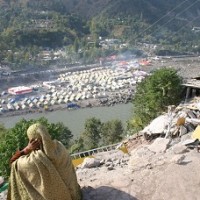Promoting Gender Equality During Disaster

~~The world today is riddled with many disasters that has plagued our world in recent years. Natural disasters adversely affect everyone- women, men, girls, boys, rich and poor who face different challenges, risks and victimization in different ways based on their gender and roles within the society.
Men and women have different but essential roles to play in responding to the effects of natural disaster while attempting to build peace during chaos. Gender inequality has undermined the ability of women and girls to exercise the full enjoyment of their rights and also to actively participate during emergency response, rehabilitation and development.
Women folks are increasingly occupying a stronger role in the several efforts of reconciliation and rebuilding their societies. Recent statistics report from the Millennium Development Goals show that 70% of the 1.3 billion people living in extreme poverty are women, and they perform 66% of the world’s work and produce half its food while earning only 10% of the world’s income and owning less than 1% of its property.
UNESCO’s gender specific programmes in disaster situations aim to increase knowledge and understanding about gender relations during and after a disaster, ensuring women’s rights together with their full participation in peace building.
After the Great East Japan Earthquake of March 2001, it was apparent that in responding to the disaster in light of the perspective of gender equality:
• Almost no women were among the decision makers at disaster sites for decisions such as the management of evacuation centres.
• Women faced a lot of difficulties because of lack of women personal supplies such as sanitary towels, women changing rooms, breastfeed space and so forth.
• The few numbers of female leaders was not enough to ensure the consideration in men’s and women’s needs.
• There was much violence against the women folks due to lack of control.
After the great east Japan earthquake, various requests were made to the relevant organizations about responses such as about the daily life at the evacuation centres and even temporary housing.
Gender equality centres are important bases for promoting gender equality in regions in order to provide information on a regular basis together with awareness projects. These activities have the advantages of collaborating with the various bodies that conduct regional activities that has become a support system conducted by such bodies during a disaster. Help us to help others who got hit by natural disaste
